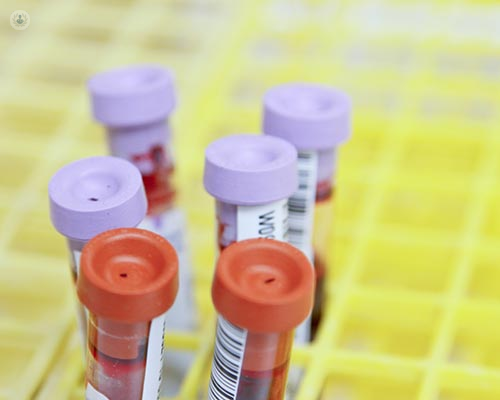Procalcitonin
What is being analysed?
Procalcitonin (PCT) is a precursor protein of the hormone calcitonin, primarily produced by the thyroid gland. It serves as a biomarker for bacterial infections, particularly severe infections like sepsis.

What does the result mean?
Elevated levels of procalcitonin typically indicate bacterial infection, while low or normal levels suggest viral infection or non-infectious inflammatory conditions.
Why do the analysis?
Procalcitonin analysis aids in the diagnosis and management of bacterial infections, guiding doctors in making timely and appropriate treatment decisions, such as initiating antibiotics or determining the duration of therapy.
When to do the analysis?
Procalcitonin analysis is particularly useful in cases of suspected bacterial infections, especially in critically ill patients, those with sepsis, or those with suspected respiratory tract infections.
What sample is required?
A blood sample is required for procalcitonin analysis, usually obtained through venipuncture.
Is any type of prior preparation necessary?
No specific prior preparation is necessary for procalcitonin analysis. However, it's essential to inform doctors about any medications or supplements being taken.
How is it used?
Procalcitonin levels are measured using immunoassay techniques. Results are interpreted alongside clinical findings to guide treatment decisions, such as antibiotic initiation, escalation, or de-escalation.
What are the normal values?
Normal procalcitonin levels in healthy individuals are typically less than 0.05 ng/mL. However, normal values can vary depending on the specific assay used by the laboratory.
What does it mean to have altered values?
Elevated levels: May indicate bacterial infection, particularly in the setting of sepsis, pneumonia, or other severe infections. Higher levels often correlate with the severity of the infection.
Low or normal levels: Suggest viral infection or non-infectious inflammatory conditions, reducing the likelihood of a bacterial aetiology. However, normal levels do not completely rule out bacterial infection, especially in early stages or in patients receiving antibiotics.
Table: Procalcitonin Reference Values
|
Normal Range |
Interpretation |
|
< 0.05 ng/mL |
Normal |
|
0.05 - 0.5 ng/mL |
Elevated (suggestive of mild bacterial infection) |
|
> 0.5 ng/mL |
Markedly Elevated (suggestive of severe bacterial infection) |
Procalcitonin levels should always be interpreted in conjunction with clinical findings and other laboratory results for accurate diagnosis and management.